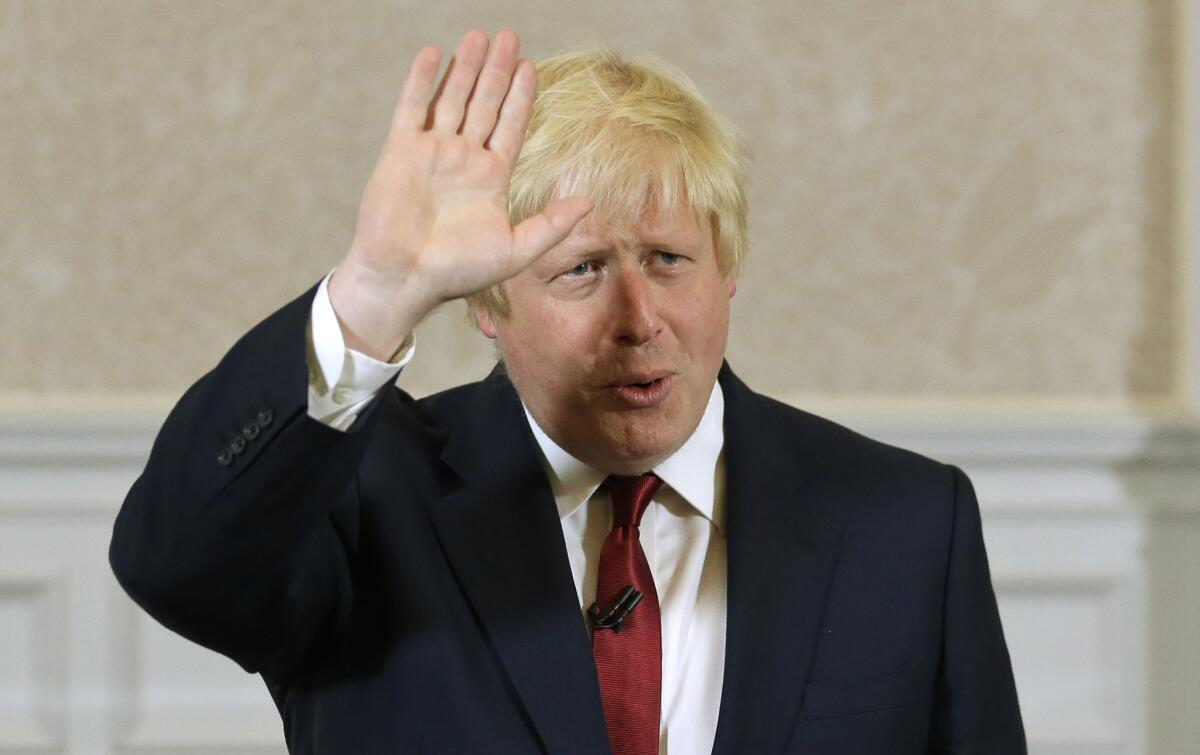Editorial: Boris Johnson’s victory in the U.K. election means there’s no going back on Brexit

- Share via
The big winner of Thursday’s election for the British House of Commons was obviously Prime Minister Boris Johnson, whose Conservative Party secured a lopsided majority in Parliament that virtually ensures that the United Kingdom will leave the European Union at the end of next month.
The biggest loser was not Labor Party leader Jeremy Corbyn, humiliating as his party’s performance was, but the British people. As a result of this election, they will be denied the opportunity to reconsider what in retrospect was a rash and reckless decision in 2016 to leave the EU. As Johnson crowed in his victory statement: “With this election I think we’ve put an end to all those miserable threats of a second referendum.”
A rerun of the Brexit referendum was always a long shot. It became even longer in October when Johnson, after warning that he was willing to leave the EU without a withdrawal agreement, managed to negotiate just such an agreement with European leaders.
Still, the door wasn’t completely shut. Despite his own seeming ambivalence about Brexit, Corbyn promised that he would negotiate a new withdrawal agreement and then submit it to the voters in a referendum in which the other option would be remaining in the EU. That possibility died with Labor’s defeat, which ironically seems to have been due in part to defections from some traditional Labor voters who supported Brexit. (Not that Brexit was the only or primary cause of Labor’s poor performance. It also was apparently hurt by a left-wing platform that included nationalizing some industries and by the seeming tolerance by Labor Party officials of anti-Semitism among some party members.)
Parliament now seems certain to approve the withdrawal deal negotiated by Johnson, which is certainly preferable to a “no-deal” Brexit. Like an earlier agreement negotiated by former Prime Minister Theresa May — but rejected by Parliament — the deal would cushion the economic shock of Brexit and seek to prevent the erection of a “hard border” between Northern Ireland, which is a part of the U.K., and the Irish Republic, which will remain in the EU.
Even so, it’s depressing that next month the U.K. will repudiate a relationship that has invigorated the British economy, helped make London a world financial capital and allowed Britons to travel freely to other parts of Europe and work and live in those countries. And the U.K. has walked away without establishing permanent trade arrangements with Europe. Those must still be worked out in additional, potentially tough negotiations before a deadline of Dec. 31, 2020.
As Johnson seeks that further agreement, he must also try contain the political fallout from his victory. In Thursday’s election, the Scottish National Party won 48 of 59 Scottish seats in Parliament. After the vote, Nicola Sturgeon, the leader of the SNP and Scotland’s first minister, warned that Johnson lacked a mandate to take Scotland out of the EU and called for a new referendum on Scottish independence. (Scottish voters rejected independence in a 2014 referendum held before the vote on Brexit.)
Johnson also must deal with the strains Brexit has created for the peace process in Northern Ireland. Preventing a hard border in the long run may require the U.K., even after Brexit, to allow Northern Ireland to be governed by EU rules or, alternatively, to have the entire U.K. join a customs arrangement with EU countries. That would require a break with the Conservative Party’s election manifesto, which said: “We will keep the U.K. out of the single market, out of any form of customs union.”
Because Johnson campaigned on the slogan “Get Brexit done,” he might be tempted to think that the Conservatives’ victory was a clear reaffirmation of Brexit. But the outcome of the election also turned on other issues and the personalities of the parties’ leaders. The voters deserved an opportunity to reconsider leaving the EU in a referendum explicitly posing that question. It’s a tragedy that they will be denied that opportunity.
More to Read
A cure for the common opinion
Get thought-provoking perspectives with our weekly newsletter.
You may occasionally receive promotional content from the Los Angeles Times.










